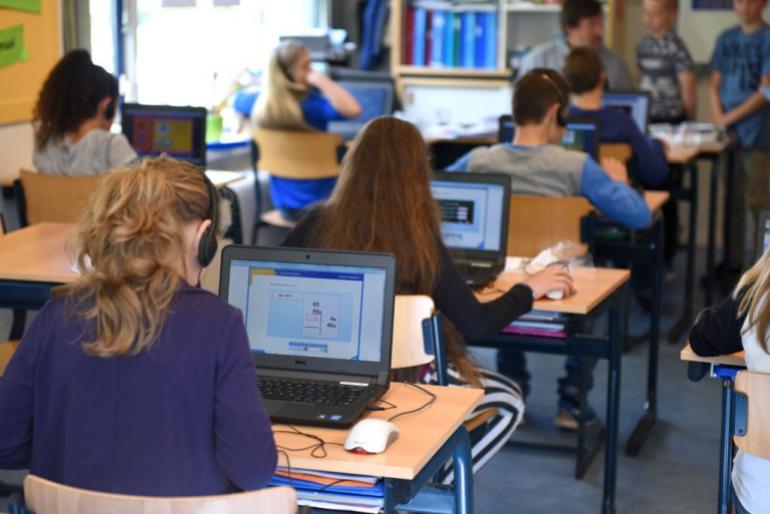While some schools and universities choose distance learning, we find that others go to schools with caution, but parents may be concerned about this matter even though schools will follow guidelines to ensure the safety of children.
Crisis in Georgia
The first week of returning to schools in Georgia carried disturbing scenes in light of the Corona virus, and it is one of the first states to reopen schools, as the image of a high school full of students wearing no masks spread, and students and employees were tested, and the result was positive for more than 200 Person.
Candice Jone, a pediatrician based in Orlando, Florida, was surprised that students in Georgia schools did not adhere to preventive measures, describing the matter to Webmd as frightening, and said, "The schools should have required students to wear masks."
View this post on Instagram
At least two students said they've been suspended at North Paulding High School in Georgia for posting photos of crowded hallways that went viral on Twitter. The photos show students packed into hallways between classes with few masks visible. One of the teens who posted photos, Hannah Watters, told BuzzFeed News she received a five-day, out-of-school suspension for violating the student code of conduct after posting one photo and one video on Twitter. Click our link in bio to read more. (📸: Hannah Watters)
A post shared by BuzzFeed News (@buzzfeednews) on Aug 6, 2020 at 11:52 am PDT
Children are less dangerous
Some experts believe that children under the age of ten may be at a lower risk of infection than older adults, and a recent study from JAMA Pediatrics' Open Research Network reported that children under five with mild to moderate symptoms had much higher levels of The genetic material of the virus is in the nose compared to older children and adults.
“We have to be careful and safe for children,” said Hild Sargent, co-author of the JAMA Network study, noting that children are not immune either.
Prevention tips
USAtoday provides advice that students should consider with students. We review them as follows:
1. Prepare food at home without relying on the school cafeteria.
2. Inculcate in students' heads the importance of washing their hands when they leave the house, arrive at school, or go to the lunchroom.
3. Avoid school buses, as much as possible. For those who live near school, it is best to ride bicycles.
4. Buy a washable cloth mask that expresses your child's personality. If your son is a fan of "Star Wars", and has a Darth Vader mask, you may ensure that your son will not lose this mask.
5. Teach your children that masks are important to protect others more than ourselves, because the great thing about younger children is that they are naturally empathetic.
6. Let your child take a bath when he returns home, and change his clothes immediately.
Important basics
Adults should help children at school by remembering to wash their hands, use antiseptics, practice social distancing, and wear face covers.
"Nothing will be 100% risk-free," Jones added. "But the goal here is to reduce the risk as much as possible and prevent spread."
The COVID-19 website, .ovid.joinzoe, monitored a number of steps to follow up on your child's safety in school, and the role of parents with children in confronting Corona and worrying about it:
1. Make hand washing fun, teach your children how to properly wash their hands with soap and water, encourage them to sing their favorite song while they wash their hands, and tell them that they have become like superheroes who do what they can to defeat the bad guys.
2. Children learn from the adults around them, so get in the habit of washing your hands regularly, avoiding people who cough or sneeze, and avoid throwing tissues in other places after using them.
3. Tracking any changes in your child's sense of smell may be a good way to recognize a Coronavirus infection early. You can encourage food exploration by asking them what they can smell, taste, and see on their plate.
4. As children return to school, we encourage parents to spend just one minute each day registering their health status on their behalf in the COVID Symptom Study app. This data will help our scientists better understand how the virus is affecting children and inform public health authorities of how and where the virus spreads as schools reopen.
5. The child must be encouraged to play and learn in the open air, as this helps reduce the risk of infection.
6. Your child may feel anxious about the things he sees or hears in relation to the Coronavirus, and as a parent, it is important to reassure him that you are there to listen when he is anxious.
And experts advise, according to the Med website, to talk to your children about the virus and hygiene, such as washing their hands and wearing masks, and check for high temperatures every morning.
Add hand sanitizer, cleaning products, and water bottles to your child's belongings in his school bag, so that children do not need to use the fountains.
And think about how they go to school, and the necessity to wear masks on the buses.
And after the end of the school day, set up a home protocol related to when children return home, such as taking off their shoes and clothes before entering, and washing their hands immediately.

